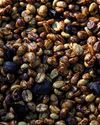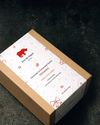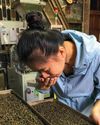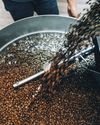
The world is changing – literally. Solid, liquid and gas carbons that have been trapped in the ground for millennia are being burned and their byproducts released into the atmosphere. As the amount of carbon dioxide increases in the atmosphere, heat that otherwise would escape into space is trapped. Climate change is the result of this increasing amount of heat in Earth’s geosphere.
As a delicate crop best grown at moderate altitude between the tropics of Cancer and Capricorn, coffee is particularly affected by climate change, and farmers across the globe are actively working to mitigate this. Higher temperatures and more rain later in the season are two key factors lowering crop yields and increasing the prevalence of disease. As a result, many traditional coffee-growing regions are expected to become unviable as the sweet spot for coffee production moves to higher altitudes in different regions. Not only will this influence the quantity, style and quality of coffees produced, it will also drive for massive social and economic challenges as farmers are forced to transition to other crops or relocate.
My quest to cut my coffee carbon footprint began when I discovered that a single cup of coffee is responsible for significant greenhouse gas emissions. A recent study found that a cappuccino has a carbon footprint of approximately 250g of carbon dioxide – the same produced by travelling 40km on Eurostar. Coffee is fuelling the modern world and raising its productivity, but it’s doing so while contributing more than its fair share of carbon. The goods news is there are simple changes we can make today. Here are five ways to reduce your coffee carbon impact.
1. Buy locally
この記事は Caffeine の Issue 42 版に掲載されています。
7 日間の Magzter GOLD 無料トライアルを開始して、何千もの厳選されたプレミアム ストーリー、9,000 以上の雑誌や新聞にアクセスしてください。
すでに購読者です ? サインイン
この記事は Caffeine の Issue 42 版に掲載されています。
7 日間の Magzter GOLD 無料トライアルを開始して、何千もの厳選されたプレミアム ストーリー、9,000 以上の雑誌や新聞にアクセスしてください。
すでに購読者です? サインイン

The Future Of Decaf?
A US company claims its pouch extracts caffeine without harming flavour

Great Coffee Shouldn't Cost The Earth
Caffeine’s editor-at-large Tim Ridley explains how to lower the environmental impact of your coffee-drinking habit

What The F**k...Is Honey Processing?
Apart from natural and washed coffees sits a whole other category, as Sierra Wen Xin Yeo explains

The grind
SEASONAL COFFEE

Tea with purpose
Michelle and Rob Comins explain how tea can be a force for good

Ten years on
We celebrate the London Coffee Festival’s first decade with a look at its successes

Chocolate and espresso pavlova with fennel roasted grapes
This year I’m giving coffee centre stage on the Christmas dessert table. I firmly believe coffee shouldn’t just be an afterthought to accompany dessert, it should be the dessert – but aside from that, it just makes sense.

Bitter Barista
Latte art competitions have been milking it for too long – they used to be fun, but now their focus on the wrong things is harming barista skills, says our cantankerous columnist

What The F**k ...Is The Maillard Reaction?
It’s just one of the elements you need to know about if you’re going to roast coffee successfully, as Edgaras Juška explains

Work Wonders
Coffee gets people through the working day. So it stands to reason that better coffee produces better work – and in some places the two are in perfect harmony, says Phil Wain